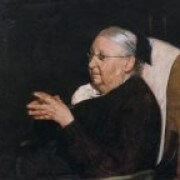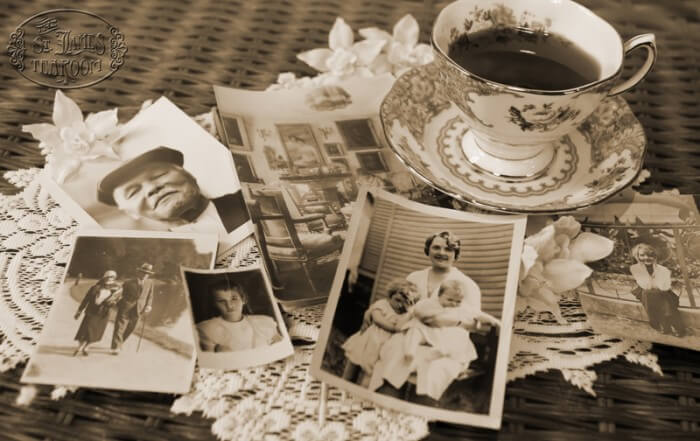
The Enduring Happiness that the Love of a Garden Gives…
“The lesson I have thoroughly learnt, and wish to pass on to others, is to know the enduring happiness that the love of a garden gives.” Gertrude Jekyll
Gertrude Jekyll is one of our prized British Greats. If you have ever been seated in Munstead Wood, this is Gertrude’s area. And since our theme for April is ‘Victory Garden’, it is a good opportunity for a word about this singular, delightful woman, who has left such a legacy of Beauty for us.

Gertrude was born in London in 1843, and lived 89 years. From childhood she loved gardens and growing things, and became one of Britain’s foremost garden designers. When you think of an English Cottage Garden, it is Gertrude who is mainly responsible. She is known for creating gardens that looked like Impressionist paintings, filled with masses of colors and textures.
Her gardens were to be lived in, not viewed. They were comfortable and approachable, meant to linger in, to picnic in, and smell. Her gardening style was anything but stuffy and formal.
Her writings on gardening are most appealing.
I am currently reading her delightful Children and Gardens, written in 1908 for child readers, not adults. As I read, I am realizing she was not only a gifted gardener, but a wise woman as well. May I gift you with a snippet or two?
- She teaches her young readers about botany and encourages them to take delight in inquiry… “because, if you are observant, which is one of the ways of being happy, you will want to know all you can about the wild flowers you see….” Who today is telling our children that being observant, being alert and attentive is a good way of being happy?
- She relates some gardening “adventures” (including her photos and drawings): finding a sleeping bat in a crack of her stone wall, getting to know the hedgehogs that frequented her lawn, finding mushrooms, waiting for an owl to begin occupying the house built for it and her delight at discovering a ‘pellet’- “It was an owl’s pellet. They hunt in the evening and catch and eat numbers of mice, and seem to swallow them whole. Their insides, after digesting the flesh of the mice, work up the fur and bones into long-shaped balls, which the owls throw up. How I should have liked to see my owl sitting at the door of his house disgorging his pellet!”
- “It is amusing to see one of the small bumble-bees go into a snapdragon flower to get the honey. He has to shove it open with his head and then works himself well inside. Then if you have got any little tool or a bit of stick in your hand, just hold it for a moment under the lip of the flower to keep it shut. Very soon he will have got all the honey he wants and will try to back out. When he finds he can’t he gets into a regular rage, and buzzes in a very angry way. You must let go after a moment, because after all he is about his rightful business, and it is only justifiable on your part to thwart him for an instant – perhaps not at all. But it is certainly amusing to see how short his temper is.”
- My favorite:“There can be no doubt that the proper place for our shoes and stockings is on or near a garden bench, where we have kicked and grabbed them off….” In all her photographs of children throughout the book, all are barefoot.
Being observant – one of the ways to be happy! I love the freedom and the challenge she gives her young readers to be observant, to learn botany, to go barefoot, to learn about an owl pellet and what disgorging means, to discover how short is a bumble-bee’s temper and that he has his rightful business. I love this woman!

Gertrude not only designed gardens, she also wrote fifteen books about gardening, and began writing these at the age of fifty five. She penned more than a thousand articles, was a painter, embroiderer, designed glass vessels, in those early days of photography, took and used her own photographs and illustrated her own books.To me she is a wonderful example of a woman growing more interesting with age. Growing older, she yet retained a youthful heart. Here are her own charming words: “I think it is because I have been more or less a gardener all my life that I still feel like a child in many ways, although from the number of years I have lived I ought to know that I am quite an old woman. But I can still – when no one is looking – climb over a five-barred gate or jump a ditch….”

Always interested and keenly observant, she took such joy in her discoveries and delights that her happiness bubbled over and influenced her generation, and ours. A Victorious Gardener, and a Woman of Influence, not by her intent, but by reason of her contagious love of and intricate observation of Beauty.
Gertrude died aged 89 at her home, Munstead Wood. Her obituary of the time closed with these words:
“Gertrude Jekyll, to whom we now bid a grateful ‘Hail and Farewell,’ sought ever for practical knowledge allied to beauty, and in that quest, whereby she may truly be said to have transfigured the gardens of England, she never grew old at heart or wearied in mind, was never discouraged by difficulty or defeated by failure, neither did she cease to share widely the fruits of her long and loving apprenticeship to Nature.”
How I should have loved knowing this woman! How grateful I am that I may at least know her through her books.
To all Victorious Gardeners out there, I remain
Yours, for the return to Grace, Civility, Beauty, Gentility, and Excellence,
Mary Alice







